The Committee stage of the Land Values (Scotland) Bill was
under discussion in the House of Lords on Wednesday. The Lord Chancellor and Lord Crewe declared that the Government desired to remove an injustice which pressed on those who bad to pay more than their fair proportion of public burdens. Lord Lansdowne urged that since they were told that there were between fifty thousand and sixty thousand empty houses in London, it was only reasonable that the owners of land should think twice before they forced their land upon the market. Ultimately the Lords accepted an amendment on Clause I. from Lord Balfour of Burleigh which did away with the compulsory character of the clause, leaving the matter of compulsion open to the option of each local authority. This amendment was carried by a majority of 87 (119-32). Another amendment substituting yearly value for capital value as the standard of valuation was passed by a majority of 62 (84-22). In our opinion, the House of Lords was perfectly justified in the course it took, though we admit that the amendments change the whole character of the measure. For our part, we object altogether to schemes of taxation being used, not to raise revenue, Imperial or local, but as an instrument for furthering a particular social or political policy. We believe in "rating for revenue only " as firmly as we believe in " tariff for revenue only." The wriber of the political notes in the Times tells us that a Unionist Peer declared that the House of Lords would not swallow the land policy of Henry George "either in bulk or in tabloids," and we fully agree with him.














































 Previous page
Previous page